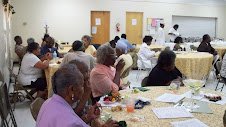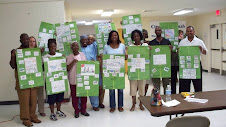
In 2004, The Harambee House, Inc./Citizens for Environmental Justice (HH/CFEJ) received an Environmental Justice (EJ) Collaborative Problem-Solving (EJ CPS) grant from EPA. Working with the Hudson Hill community in Savannah and other partners, HH/CFEJ documented the community history and health concerns of Hudson Hill residents. Building on the model developed with Hudson Hill, HH/CFEJ developed the Savannah Community Environmental Collaborative to expand its work to the Woodville community.
In 2007, HH/CFEJ was awarded a CARE Level I grant. The purpose of the CARE Level I project grant was to engage the residents from both the Hudson Hill and Woodville communities in a risk assessment process and to prioritize their action to help restore community confidence in their own ability to reduce harm to their health and neighborhoods. The Hudson Hill and Woodville communities worked with HH/CFEJ, EPA and other stakeholders (i.e. residents, industry, elected officials, govermental agencies) to build partnerships, identify environmental problems and create solutions to environmental problems.
In 2009, HH/CFEJ was awarded a CARE Level II grant. The purpose of the CARE Level II project grant was to mobilize the residents from both the Hudson Hill and Woodville communities in advocacy, education and outreach activities while helping to nurture and support community leaders in Hudson Hill and Woodville. The Hudson Hill and
Woodville communities worked with HH/CFEJ, EPA and other stakeholders (i.e. residents, industry, elected officials, governmental agencies) to take action to reduce environmental risks and become self-sustaining.
For more information, please visit http://www.epa.gov/care/savannah.htm.
In 2007, HH/CFEJ was awarded a CARE Level I grant. The purpose of the CARE Level I project grant was to engage the residents from both the Hudson Hill and Woodville communities in a risk assessment process and to prioritize their action to help restore community confidence in their own ability to reduce harm to their health and neighborhoods. The Hudson Hill and Woodville communities worked with HH/CFEJ, EPA and other stakeholders (i.e. residents, industry, elected officials, govermental agencies) to build partnerships, identify environmental problems and create solutions to environmental problems.
In 2009, HH/CFEJ was awarded a CARE Level II grant. The purpose of the CARE Level II project grant was to mobilize the residents from both the Hudson Hill and Woodville communities in advocacy, education and outreach activities while helping to nurture and support community leaders in Hudson Hill and Woodville. The Hudson Hill and
Woodville communities worked with HH/CFEJ, EPA and other stakeholders (i.e. residents, industry, elected officials, governmental agencies) to take action to reduce environmental risks and become self-sustaining.
For more information, please visit http://www.epa.gov/care/savannah.htm.



